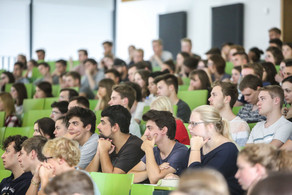Prof. Dr. Ricarda Steinmayr
E-mail: ricarda.steinmayrtu-dortmundde
Department of Psychology
Tel.: +49 231 755 7118
Emil-Figge-Straße 50, Room 2.330

Office hours
Consultation hours during the lecture period: Thursday from 12.00 - 13.00, Consultation hours after prior registration at least 3 days in advance by e-mail to: Heike Knieriem
Consultation hour dates during the lecture-free period are yet to be announced. Registration (1 week in advance) is by prior arrangement by e-mail to: Heike Knieriem
Focus of work
- Determinants of educational achievement behavior considering motivation, gender, social background and intelligence
- Subjective well-being
- Intellectual giftedness
- Educational diagnostics
Office hours
As mentioned above, an e-mail is sent here directly to Ms. Heike Knieriem if there is a consultation requirement with Prof. Dr. Ricarda Steinmayr.
More information
since 2012 Professor for Educational and Differential Psychology TU Dortmund University
02/2019 - 06/2019 Visiting Professorship NUI Galway Ireland
2012 Parental leave
2010 - 2012 Professor for Educational Psychology University of Marburg
2009 - 2010 Parental leave
2002 - 2009 Research Assistant at the Psychology Institute University of Heidelberg
2010 Habilitation University of Heidelberg
2002 - 2005 Doctorate University of Heidelberg
1999 - 2002 Graduate Studies in Psychology RWTH Aachen University
1998 - 1999 Graduate Studies University of Oklahoma, USA
1996 - 1998 Undergraduate Studies in Psychology University of Düsseldorf
1995 - 1996 "European Business Studies" University of Applied Sciences Bochum
Publications
Complete list of publications including conference papers as PDF
Accepted/in press
- Bergold, S. & Steinmayr, R. (accepted). Teacher Judgments Predict Adolescents' Development in School Performance, Motivation, and Life Satisfaction. Journal of Educational Psychology.
- Mächel, L., Steinmayr, R., Christiansen, H. & Wirthwein, L. (accepted). On the Association between Students' (Domain-Specific) Subjective Well-being and Academic Achievement - Disentangling Mixed Findings. Current Psychology.
- Steinmayr, R., Paschke, P., & Wirthwein, L. (2022). Elementary School Students' Subjective Well-Being Before and During the COVID-19 Pandemic: A Longitudinal Study. Journal of Happiness Studies. Advance online publication doi: 10.1007/s10902-022-00537-y
- Tometten, L., Heyder, A. & Steinmayr, R. (2021). Links between teachers' knowledge about special educational needs and students' social participation and academic achievement in mainstream classes. Contemporary Educational Psychology, 67, 102022. Advance online publication https://doi.org/10.1016/j.cedpsych.2021.102022
- Blötner, C., Steinmayr, R., & Bergold, S. (2021). Malicious mind readers? A meta-analysis on Machiavellianism and cognitive and affective empathy. Personality and Individual Differences, 181, 111023. Advance online publication https://doi.org/10.1016/j.paid.2021.111023
- Paschke, P., Weidinger, A. & Steinmayr, R. (2020). Separating the Effects of Self-Evaluation Bias and Self-View on Grades. learning & Individual Differences. advance online publication doi: 10.1016/j.lindif.2020.101940
- Heyder, A., Weidinger, A.F., Cimpian, A., & Steinmayr, R. (2020). Teachers' belief that math requires innate ability predicts lower intrinsic motivation among low-achieving students. Learning and Instruction, 65, 101220. Advance online publication https://doi.org/10.1016/j.learninstruc.2019.101220
- Tometten, L., Heyder, A. & Steinmayr, R. (accepted). Capturing diversity knowledge in the context of inclusive psychological teacher education. Education and Instruction.
2022
- Frank, B. P., Theil, C. M., Brill, N., Christiansen, H., Schwenck, C., Kieser, M., Reck, C., Steinmayr, R. , Wirthwein, L., Otto, K., & COMPARE-family Research Group (2022). Leave Me Alone With Your Symptoms! Social Exclusion at the Workplace Mediates the Relationship of Employee's Mental Illness and Sick Leave. Frontiers in public health, 10, 892174. doi.org/10.3389/fpubh.2022.892174
- Michel, Y. A., Steinmayr, R. , Frenzel, A.C., & Ziegler, M. (2022). Unpacking domain-specific achievement motivation: the role of contextualising items for test-criterion correlations. Educational Psychology, 42, 501-525. doi: 10.1080/01443410.2020.1713303
2021
- Steinmayr, R., Lazarides, R., Weidinger, A. & Christiansen, H. (2021). Teaching and Learning During the first COVID-19 School Lockdown: Realization and Associations with Parent-Perceived Students' Academic Outcomes-A study and preliminary overview. Journal of Educational Psychology, 35, 85-106. https://doi.org/10.1024/1010-0652/a000306
- Wirthwein, L., & Steinmayr, R. (2021). Performance-approach goals: the operationalization makes the difference. European Journal of Psychology of Education, 36, 1199-1220. doi: 10.1007/s10212-020-00520-2
- Heyder, A., Weidinger, A. F., & Steinmayr, R. (2021). only a burden for females in math? Gender and domain differences in the relation between adolescents' fixed mindsets and motivation. Journal of Youth and Adolescence, 50, 177-188. doi: 10.1007/s10964-020-01345-4
- Bergold, S., Weidinger, A. F., & Steinmayr, R. (2021). The "Big Fish" From the Teacher's Perspective: A Closer Look at Reference Group Effects on Teacher Judgments. Journal of Educational Psychology, 114, 656-680 . http://dx.doi.org/10.1037/edu0000559
- Bergold, S., Hastall, M. & Steinmayr, R. (2021). 'Alternative Facts' about the Intellectually Gifted: Two Experiments on Stigmatization Effects from Biased Newspaper Reports. Gifted Child Quaterly, 65, 75-94.
- Thorell, L.B., Skoglund, C., de la Peña, A.G., Baeyens, D., Fuermaier, A.B.M., Groom, M.J., ... Steinmayr, R. , ... Christiansen, H. (2021). Parental experiences of homeschooling during the COVID-19 pandemic: differences between seven European countries and between children with and without mental health conditions. European Child & Adolescent Psychiatry. doi: 10.1007/s00787-020-01706-1
- Wirthwein, L., Bergold, S., Steinmayr, R. (2021). On the relevance of reference norm orientations and goal orientations for subjective well-being in mathematics education. In Lazarides, R., Raufelder, D. (eds) Motivation in instructional subject-based teaching-learning contexts (pp. 211-236). Edition ZfE, vol 10. Springer VS, Wiesbaden. doi.org/10.1007/978-3-658-31064-6_8
2020
-
Bergold. S., Wirthwein, L. & Steinmayr, R. (2020). Similarities and Differences between Intellectually Gifted and Average-Ability Students in School Performance, Motivation, and Subjective Well-Being. Gifted Child Quaterly, 64, 285 - 303.
-
Lauermann, F., Meißner, A, & Steinmayr, R. (2020). Relative importance of intelligence and ability self-concept in predicting test performance and school grades in the math and language arts domains. Journal of Educational Psychology, 112, 364-383. doi: 10.1037/edu0000377
-
Heyder, A., Südkamp, A., & Steinmayr, R. (2020). How are teachers' attitudes toward inclusion related to the social-emotional school experiences of students with and without special educational needs?Learning and Individual Differences, 77, 101776. doi:10.1016/j.lindif.2019.101776.
-
Weidinger, A.F., Spinath, B., & Steinmayr, R. (2020). The value of valuing math: Longitudinal links between students' intrinsic, attainment, and utility values and grades in math. Motivation Science, 6, 413-422. doi: 10.1037/mot0000179
-
Bergold, S., Kasper, D., Wendt, H. & Steinmayr, R. (2020). being bullied at school: the case of high-achieving boys. social psychology of education, 23, 315-338.
-
Türk, S., Harbarth, S., Bergold, S., Steinmayr, R. , Neidhardt, E., Kamp-Becker, I., . . . Christiansen, H. (2020). Do German Children Differ? A Validation of Conners Early Childhood™ Journal of Attention Disorders, 25, 1441-1454. doi: 10.1177/1087054720907955
2019
- Steinmayr, R. & Spinath, B. (2019). Why time constraints increase the gender gap in measured numerical intelligence in academically high achieving samples. European Journal of Psychological Assessment, 35, 392-402.doi: 10.1027/1015-5759/a000400
- Steinmayr, R., Wirthwein, L., Modler, L., & Barry, M.M. (2019). Development of Subjective Well-Being in Adolescence. International Journal of Environmental Research and Public Health, 16, 3690. doi.org/10.3390/ijerph16193690.
- Steinmayr, R. , Weidinger, A. F., Schwinger, M. & Spinath, B. (2019). The importance of students' motivation for their academic achievement-Replicating and extending previous findings. Frontiers in Psychology, 10, 1730. doi: 10.3389/fpsyg.2019.01730
-
Wirthwein, L., Bergold, S., Preckel, F., & Steinmayr, R. (2019). Personality and school functioning of intellectually gifted and nongifted adolescents: Self-perceptions and parents' assessments. Learning and Individual Differences, 73, 16-29. doi: https://doi.org/10.1016/j.lindif.2019.04.003
-
Wirthwein, L., Sparfeldt, J.R., Heyder, A., Buch, S.R., Rost, D.H., & Steinmayr, R. (2019). Sex differences in achievement goals: do school subjects matter? European Journal of Psychology of Education. doi: 10.1007/s10212-019-00427-7
-
Christiansen, H., Reck, C., Zietlow, A. -L., Otto, K., Steinmayr, R. , Wirthwein, L., . . . Schwenck, C. (2019). Children of Mentally III Parents at Risk Evaluation (COMPARE): Design and Methods of a Randomized Controlled Multicenter Study-Part I. Frontiers in Psychiatry, 10. doi: 10.3389/fpsyt.2019.00128
-
Heyder, A., Steinmayr, R., & Kessels, U. (2019). Do Teachers' Beliefs About Math Aptitude and Brilliance Explain Gender Differences in Children's Math Ability Self-Concept? Frontiers in Education, 4. doi: 10.3389/feduc.2019.00034
-
Weidinger, A.F., Steinmayr, R., & Spinath, B. (2019). Ability self-concept formation in elementary school: No dimensional comparison effects across time. Developmental Psychology, 55, 1005-1018. doi: 10.1037/dev0000695 and 10.1037/dev0000695.supp (Supplemental).
-
Bergold, S., & Steinmayr, R. (2019). Non Vitae Sed Scholae Discimus? Schooling Fosters Intelligence Neuroforum. doi: 10.1515/nf-2018-0027
-
Steinmayr, R. , Weidinger, A. F., Heyder, A. & Bergold, S. (2019). Why do girls estimate their mathematical competencies lower than boys? - An explanatory attempt considering grades, achievement tests, teacher and parent assessments. Journal of Developmental and Educational Psychology, 51, 71-83. doi: 10.1026/0049-8637/a000213
-
Crede, J., Wirthwein, L., Steinmayr, R. & Bergold, S. (2019). Students with special educational needs in emotional and social development and their peers in inclusive classrooms: differences in social participation, school attitudes, and school self-concept. Journal of Educational Psychology, 33, 207-221.
-
Bergold, S. & Steinmayr, R. (2019). Intelligence diagnostics in giftedness and special educational needs in learning. In F. Zimmermann, J. Möller & T. Riecke-Baulecke (Eds.), Basiswissen Lehrerbildung: School-based diagnostics and performance assessment (pp. 178-192). Seelze: Klett-Kallmeyer.
2018
- Bergold, S. & Steinmayr, R. (2018). Personality and Intelligence Interact in the Prediction of Academic Achievement. Journal of Intelligence, 6, 27. doi: 10.3390/jintelligence6020027
- Heyder, Anke, Bergold, Sebastian, & Steinmayr, Ricarda. (2018). Teachers' knowledge about intellectual giftedness: A first look at level and correlates. Psychology Learning and Teaching, 17, 27-44. doi:10.1177/1475725717725493 .
- Kretzschmar, A., Spengler, M., Schubert, A.-L., Steinmayr, R., Ziegler, M. (2018). The Relation of Personality and Intelligence - What can the Brunswik Symmetry Principle tell us? Journal of Intelligence, 6, 30; doi:10.3390/jintelligence6030030
- Steinmayr, R., Heyder, A., Naumburg, C., Michels, J., & Wirthwein, L. (2018). School-Related and Individual Predictors of Subjective Well-Being and Academic Achievement. Frontiers in Psychology, 9(2631). doi: 10.3389/fpsyg.2018.02631
- Steinmayr, R., Weidinger, A.F. & Wigfield, A. (2018). Does Students' Grit Predict Their School Achievement Above and Beyond Their Personality, Motivation, and Engagement? Contemporary Educational Psychology, 53, 106-122. doi: 10.1016/j.cedpsych.2018.02.004
- Bergold, S., Wirthwein, L. & Steinmayr, R. (2018). Subjective well-being of intellectually gifted children and adolescents. In I. Gonzáles-Burgos (Ed.), Psychobiological, clinical, and educational aspects of giftedness (pp. 143-165). Hauppauge, NY: Nova.
- Heyder, A., Vaskova, A., Hußmann, A. & Steinmayr, R. (2018). Prospective teachers' knowledge of diversity in the context of school-based inclusion: The development of a knowledge test and initial results. In Hußmann, S. & Welzel, B. (Eds.). Dortmund profile for inclusion-oriented teacher education. (pp. 267-277). Münster: Waxmann.
- Steinmayr, R., Sauer, J. & Gamsjäger, E. (2018). Forecasting. In D.H. Rost, S. Buch & J. Sparfeldt (Eds.), Handwörterbuch der Pädagogischen Psychologie (pp. 653 - 665). Weinheim: Beltz.
- Wirthwein, L., Steinmayr, R. & Bergold, S. (2018). Well-being and school performance. In K. Rathmann & K. Hurrelmann (Eds.), Performance and well-being in school: The challenge of inclusion (pp. 105-120). Weinheim: Beltz.
2017
- Steinmayr, R., & Kessels, U. (2017). Good at school = successful on the job? Explaining gender differences in scholastic and vocational success. Personality and Individual Differences, 105, 107-115. http://dx.doi.org/10.1016/j.paid.2016.09.032
- Bergold, S., Wendt, H., Caspar, D., & Steinmayr, R. (2017). Scholastic Competencies: Their Interrelatedness and Gender Differences at Their High End. Journal of Educational Psychology, 109, 439 - 449. doi:10.1037/edu0000140.
- Weidinger, A., Steinmayr, R., & Spinath, B. (2017). Changes in the Relation between Competence Beliefs and Achievement in Math across Elementary School Years. Child Development. doi:10.1111/cdev.12806 .
- Weidinger*, A., Steinmayr*, R., & Spinath, B. (2017). Math Grades and Intrinsic Motivation in Elementary School: A Longitudinal Investigation of Their Association. British Journal of Educational Psychology. (*contributed equally). doi:10.1111/bjep.12143 .
- Heyder, A., Kessels, U., & Steinmayr, R. (2017). Explaining academic-track boys' underachievement in language grades: Not a lack of aptitude but students' motivational beliefs and parents' perceptions? British Journal of Educational Psychology. doi:10.1111/bjep.12145 .
- Bergold, S., Wirthwein, L., Rost, D. H., & Steinmayr, R. (2017). What happens if the same curriculum is taught in five instead of six years? A quasi-experimental investigation of the effect of schooling on intelligence. Cognitive Development, 44, 98-109. doi:10.1016/j.cogdev.2017.08.012
2016
- Bergold, S., & Steinmayr, R. (2016). The relation over time between achievement motivation and intelligence in young elementary school children: A latent cross-lagged analysis. Contemporary Educational Psychology, 46, 228-240. doi:10.1016/j.cedpsych.2016.06.005 .
- Grunschel, C., Schwinger, M., Steinmayr, R., & Fries, S. (2016). Effects of using motivational regulation strategies on students' academic procrastination, academic performance, and well-being. Learning and Individual Differences, 49, 162-170. doi:10.1016/j.lindif.2016.06.008 .
- Meißner, A., Greiff, S., Frischkorn, G.T., & Steinmayr, R. (2016). Predicting Complex Problem Solving and school grades with working memory and ability self-concept. Learning and Individual Differences, 49, 323-331. doi:10.1016/j.lindif.2016.04.006 .
- Schwinger, M., Steinmayr, R., & Spinath, B. (2016). Achievement goal profiles in elementary school: Antecedents, consequences, and longitudinal trajectories. Contemporary Educational Psychology, 46, 164-179. doi:10.1016/j.cedpsych.2016.05.006 .
- Weidinger, A., Spinath, B. & Steinmayr, R. (2016). Why Does Intrinsic Motivation Decline Following Negative Feedback? The Mediating Role of Competence Beliefs and its Moderation by Goal Orientations. Learning & Individual Differences, 47, 117-128. doi:10.1016/j.lindif.2016.01.003 .
- Steinmayr, R., Crede, J., McElvany, N., & Wirthwein, L. (2016). Subjective Well-Being, Test Anxiety, Academic Achievement: Testing for Reciprocal Effects. frontiers in psychology, 6. doi:10.3389/fpsyg.2015.01994 .
- El-Khechen, W., Ferdinand, H.D., Steinmayr, R., & McElvany, N. (2016). language-related values, reading amount, and reading comprehension in students with migration backgrounds. British Journal of Educational Psychology, 86, 256-277. doi:10.1111/bjep.12102 .
- Wendt, H., Steinmayr, R. & Kasper, D. (2016). Gender differences in mathematics and science competencies. In H. Wendt, W. Bos, C.Selter, O. Köller, K. Schwippert & D. Kasper (Eds.). TIMSS 2015. mathematical and scientific competencies of primary school children in Germany(pp.257-298). Münster: Waxmann.
- Weidinger, A. F., & Steinmayr, R. (2016). On the development of motivation in elementary school - What makes the difference? In H. Griest, T. Goll & A. Hartinger (Eds.), The connectivity of subject matter teaching - between competence orientation and personality development, lifeworld and subject reference (pp. 35 - 48). Bad Heilbrunn: Klinkhardt.
2015
- Steinmayr, R., Bergold, S., Margraf-Stiksrud, J., & Freund, P. A. (2015). Gender differences on general knowledge tests: Are they due to Differential Item Functioning? Intelligence, 50, 164-174.
- Steinmayr, R. & Spinath, B. (2015). Intelligence as a potential moderator in the Internal/External Frame of Reference Model. Journal of Educational Research Online, 7, 198-218.
- Bergold, Sebastian, Wirthwein, Linda, Rost, Detlef H., & Steinmayr, Ricarda. (2015). Are gifted adolescents more satisfied with their lives than their nongifted peers? Frontiers in Psychology, 6. doi:10.3389/fpsyg.2015.01623 .
- Crede J., Wirthwein L., McElvany, N. & Steinmayr, R. (2015). Adolescents' academic achievement and life satisfaction: the role of parents' education. Frontiers in Psychology. 6:52.
- Dinger, F.C., Dickhäuser, O., Hilbig, B.E., Müller, E., Steinmayr, R., & Wirthwein, L. (2015). From basic personality to motivation: Relating the HEXACO factors to achievement goals. Learning and Individual Differences, 40, 1-8. doi:10.1016/j.lindif.2015.03.023 .
- Christiansen, H., Hirsch, O., König, A., Steinmayr, R., & Röhrle, B. (2015). prevention of ADHD related problems: a universal preschool program. health Education, 115, null. doi:10.1108/HE-03-2014-0040 .
- Weidinger, A., Spinath, B. & Steinmayr, R. (2015). On the importance of elementary school grades for changes in intrinsic motivation and ability self-concept in German. Journal of Educational Psychology, 29, 193-204.
2014
- Steinmayr, R., Meißner, A., Weidinger, A. F.. & Wirthwein, L. (2014). Academic Achievement. In L. H. Meyer (Ed.) Oxford Bibliographies Online: Education. New York: Oxford University Press.
- Steinmayr, R., Schöne, C. & Wirthwein, L. (2014). Gender and numerical intelligence: Does motivation matter? Learning & Individual Differences, 32, 140-147.
- Schwinger, M., Wirthwein, L., Lemmer, G., & Steinmayr, R. (2014). Academic self-handicapping and achievement: A meta-analysis. Journal of Educational Psychology, 106, 744-761.
- Blümke, M., Bipp, T., Heene, M. & Steinmayr, R. (2014). The leadership competency model of the 'Adaptive Leadership Competency Profile (ALCP)': A validity test using probabilistic test theory. Business Psychology, 16, 81-94.
- Spinath, B., Eckert, C. & Steinmayr, R. (2014). Gender differences in school success: What are the roles of students' intelligence, personality and motivation? Educational Research, 56, 230-243.
- Rost, D.H., Wirthwein, L. & Steinmayr, R. (2014). How usable is the "Overexitability Questionnaire-Two (OEQII)"-Development and psychometric analysis of a reduced German-language version (oversensitivity questionnaire OEQ-D) and first validity indications. Diagnostica, 60, 211-228.
2013
- Steinmayr, R. & Meißner, A. (2013). On the importance of ability self-concept and intelligence in predicting grades and standardized achievement tests. Journal of Educational Psychology, 27, 273-282.
- Wirthwein, L., Sparfeldt, J.R., Pinquart, M., Wegerer, J. & Steinmayr, R. (2013). Achievement Goals and academic achievement: A closer look at moderating factors. Educational Research Review, 10, 66-89.
- Dinger, F. C., Dickhäuser, O., Spinath, B., & Steinmayr, R. (2013). Antecedents and consequences of students' achievement goals: A mediation analysis. Learning and Individual Differences, 28, 90-101.
- Kessels, U. & Steinmayr, R. (2013). Macho man in school: Toward the Role of Gender Role Self-Concepts and Help-Seeking in School Performance. Learning and Individual Differences, 23, 234-240.
- Kessels, U. & Steinmayr, R. (2013). The subjective value of school as a function of verbal and mathematical self-concept. Journal of Educational Psychology, 27, 105-113.
2012
- Spinath, B. & Steinmayr, R. (2012). The Roles of Competence Beliefs and Goal Orientations for the Change in Intrinsic Motivation. Journal of Educational Psychology, 104, 1135-1148.
- Freiberger, V., Steinmayr, R., & Spinath, B. (2012). Students' Competence Beliefs and Their Perceived Teachers' Ability Evaluations- How do both Contribute to Students' Intrinsic Motivation and Achievement in Math? Learning and Individual Differences, 22, 518-522.
- Bipp, T., Steinmayr, R., & Spinath, B. (2012). A functional look at goal orientations: Their role for self-estimates of intelligence and performance. Learning and Individual Differences, 22, 280-289.
- Schwinger, M., Steinmayr, R., & Spinath, B. (2012). Not all roads lead to Rome-Comparing different types of motivational regulation profiles. Learning and Individual Differences, 22, 269-279.
- Steinmayr, R., Dinger, F. C., & Spinath, B. (2012). Motivation as a mediator of social disparities in academic achievement. European Journal of Personality, 26, 335-349.
2011
- Blickle, G., Momm, T., Liu, Y., Witzki, A., & Steinmayr, R. (2011). Construct validation of the Test of Emotional Intelligence (TEMINT): A two-study investigation. European Journal of Psychological Assessment, 27, 282-289.
- Steinmayr, R., Bipp, T., & Spinath, B. (2011). Goal orientations predict academic performance beyond intelligence and personality. Learning and Individual Differences, 21, 196-200.
- Steinmayr, R., & Amelang, M. (2011). On the diagnostics of connotatively negative constructs using the example of narcissism, Machiavellianism, and psychopathy. In L. Hornke, M. Kersting & M. Amelang (Eds.), Encyclopedia of psychology, Vol. IV - Personality diagnostics (pp. 639-688). Göttingen: Hogrefe.
- Steinmayr, R., & Reuschenbach, B. (2011). Capturing anxiety in the hospital. In B. Reuschenbach & C. Mahler (Eds.), Handbook of nursing-related assessment procedures. (S. 441-458). Bern: Huber Publishers.
- Steinmayr, R., Schütz, A., Hertel, J., & Schröder Abé, M. (2011). mayer-salovey-caruso emotional intelligence test (MSCEITTM). German language adaptation of the Mayer-Salovey-Caruso Emotional Intelligence Test (MSCEITTM) by John D. Mayer, Peter Salovey, and David R. Caruso. Bern: Verlag Hans Huber.
2010
- Steinmayr, R. & Spinath, B. (2010). Construction and initial validation of a scale to assess subjective school values (SESSW). Diagnostica, 56, 195-211.
- Steinmayr, R., Beauducel, A. & Spinath, B. (2010). Do sex differences in a faceted model of fluid and crystallized intelligence depend on the method applied? Intelligence, 38, 101-110.
- Steinmayr, R., Dinger, F. C., & Spinath, B. (2010). Parents? education and children?s achievement: the role of personality. European Journal of Personality, 24, 535-550.
- Steinmayr, R., Ziegler, M & Träuble, B. (2010). Do intelligence and sustained attention interact in predicting academic achievement? Learning and Individual Differences, 20, 14-18.
2009
- Steinmayr, R. & Spinath, B. (2009). What explains boys' stronger confidence in their intelligence? Sex Roles, 61, 736-749.
- Steinmayr, R. & Spinath, B. (2009). The importance of motivation as a predictor of school achievement. Learning and Individual Differences, 19, 80-90.
- Schwinger, M., Steinmayr, R. & Spinath, B. (2009). How do motivational regulation strategies affect achievement: mediated by effort management and moderated by intelligence. Learning and Individual Differences, 19, 621-627.
2008
- Spinath, B. & Steinmayr, R. (2008). Longitudinal analysis of intrinsic motivation and competence beliefs: Is there a relation over time? Child Development, 79, 1555-1569.
- Steinmayr, R. & Spinath, B. (2008). Sex differences in school achievement: What are the roles of personality and achievement motivation. European Journal of Personality, 22, 185-209.
- Amelang, M. & Steinmayr, R. (2008). Nürburgring 1980: The duel between Jon Ekerold and Toni Mang. VFV-Info, 40, 16-18.
- Steinmayr, R. (2008). Test review - DISK-GITTER with SKSLF-8 - Differential School Self-Concept Grid with Scale for the Assessment of Self-Concept of School Achievement and Abilities. Journal of Educational Psychology, 22, 165-169.
- Steinmayr, R., Stürmer, T. & Amelang, M. (2008). Cognitions on the development of cancer and cardiovascular disease. Journal of Health Psychology, 16, 73-82.
- Steinmayr, R. & Kersting, M. (2008). Falsifiability of personality tests-A problem for social acceptance. In W. Sarges & Scheffer, D. (Eds.), Innovations in aptitude diagnostics (pp. 31-40). Göttingen: Hogrefe.
- Knapp-Rudolph, M., Steinmayr, R. & Amelang, M. (2008). Construction and testing of the Adaptive Test for Emotion Regulation (ATEM) as a facet of Emotional Intelligence. In W. Sarges & Scheffer, D. (Eds.), Innovations in aptitude assessment (pp.145-154). Göttingen: Hogrefe.
- Bipp, T., Steinmayr, R. & Spinath, B. (2008). Personality and achievement motivation: Relationship among Big Five domain and facet scales, achievement goals, and intelligence. Personality and Individual Differences, 44, 1454-1464.
2007
- Steinmayr, R. & Spinath, B. (2007). Predicting school achievement from motivation and personality. Zeitschrift für Pädagogische Psychologie [German Journal of Educational Psychology], 21, 207-216.
- Steinmayr, R. & Schmidt, S. (2007). Metacognitions. In J. Zumbach & H. Mandl (Eds.), Educational psychology in theory and practice (pp. 105-112). Göttingen: Hogrefe.
- Steinmayr, R. (2007). Requirements analysis in managers. Hamburg: Dr. Kovač Publishing.
- Steinmayr, R. & Amelang, M. (2007). Intelligence and intelligence testing. In K. Landau (Ed.), Lexikon Arbeitsgestaltung - Best practice in the work process (pp. 693-695). Stuttgart: Gentner Verlag.
2006
- Steinmayr, R. & Amelang, M. (2006). Investigations on the criterion validity of the I-S-T 2000 R on adults of both sexes. Diagnostica, 52, 181-188.
- Amelang, M. & Steinmayr, R. (2006). Is there a validity increment for tests of Emotional Intelligence in explaining the variance of performance criteria? Intelligence, 34, 459-468.
- Harris, J.A., Steinmayr, R. & Amelang, M. (2006). Inter- and Intraindividual Differences in Personality in Two German Samples of High and Low Intelligence. Personality and Individual Differences, 40, 433-440.
- Steinmayr, R. (2006). personnel selection procedures - process and social acceptance from the applicants' perspective. Saarbrücken: VDM Verlag Dr. Müller.
Unpublished works
- Steinmayr, R. (2005). Competence- and trait-based requirement analyses on samples of managers and employees. www.ub.uni-heidelberg.de/archiv/5974
- Sonntag, Kh., Schmidt-Rathjens, C. & Steinmayr, R. (2003). Adaptation of an analysis procedure for the redefinition of task and requirement profiles for function holders in the post office and sales (PV) area of Swiss Post. Final report and data volume. Heidelberg: ABO Institute.
- Steinmayr, R. (2002). The social acceptance of personnel selection procedures - Investigation of the Berlin Intelligence Structure Test of the German Society for Human Resources (BIS-r-DGP) and the Scales for Service and Customer Orientation (SKASUK). RWTH Aachen: Unpublished diploma thesis.
- Vink, P., Steinmayr, R. & Noro, K. (2001). Essential roles in a participatory improvement process. Participative Simulation for Integral Manufacturing enterprise renewal, Periodic Progress Report No: 2, pp. 50-56.






